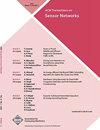A Collaborative Learning-based Urban Low-light Small-target Face Image Enhancement Method
IF 4.7
4区 计算机科学
Q2 COMPUTER SCIENCE, INFORMATION SYSTEMS
引用次数: 0
Abstract
Face recognition is an essential technology in intelligent transportation and security within smart cities. Nevertheless, face images taken in nighttime urban environments often suffer from low brightness, small sizes, and low resolution, which pose significant challenges for accurate face feature recognition. To address this issue, we propose the Low-light Small-target Face Enhancement (LSFE) method, a collaborative learning-based image brightness enhancement approach specifically designed for small-target faces in low-light environments. LSFE employs a multilevel feature stratification module to acquire detailed face image features at different levels, revealing hidden facial image information within the dark. In addition, we design a network combining collaborative learning and self-attention mechanisms, which effectively captures long-distance pixel dependencies in low-brightness face images and enhances their brightness in a stepwise manner. The enhanced feature maps are then fused through a branch fusion module. Experimental results demonstrate that LSFE can more effectively enhance the luminance of small-target face images in low-light scenes while retaining more visual information, compared to other existing methods.基于协同学习的城市微光小目标人脸图像增强方法
人脸识别是智能交通和智慧城市安全的重要技术。然而,在夜间城市环境中拍摄的人脸图像往往存在亮度低、尺寸小、分辨率低等问题,这对人脸特征的准确识别构成了重大挑战。为了解决这个问题,我们提出了低光小目标人脸增强(LSFE)方法,这是一种专门为低光环境下的小目标人脸设计的基于协作学习的图像亮度增强方法。LSFE采用多层次特征分层模块,获取不同层次的详细人脸图像特征,揭示黑暗中隐藏的人脸图像信息。此外,我们设计了一个结合协作学习和自注意机制的网络,有效捕获低亮度人脸图像的远距离像素依赖,并逐步增强其亮度。然后通过分支融合模块融合增强的特征图。实验结果表明,与现有方法相比,LSFE可以更有效地增强低光场景下小目标人脸图像的亮度,同时保留更多的视觉信息。
本文章由计算机程序翻译,如有差异,请以英文原文为准。
求助全文
约1分钟内获得全文
求助全文
来源期刊

ACM Transactions on Sensor Networks
工程技术-电信学
CiteScore
5.90
自引率
7.30%
发文量
131
审稿时长
6 months
期刊介绍:
ACM Transactions on Sensor Networks (TOSN) is a central publication by the ACM in the interdisciplinary area of sensor networks spanning a broad discipline from signal processing, networking and protocols, embedded systems, information management, to distributed algorithms. It covers research contributions that introduce new concepts, techniques, analyses, or architectures, as well as applied contributions that report on development of new tools and systems or experiences and experiments with high-impact, innovative applications. The Transactions places special attention on contributions to systemic approaches to sensor networks as well as fundamental contributions.
 求助内容:
求助内容: 应助结果提醒方式:
应助结果提醒方式:


